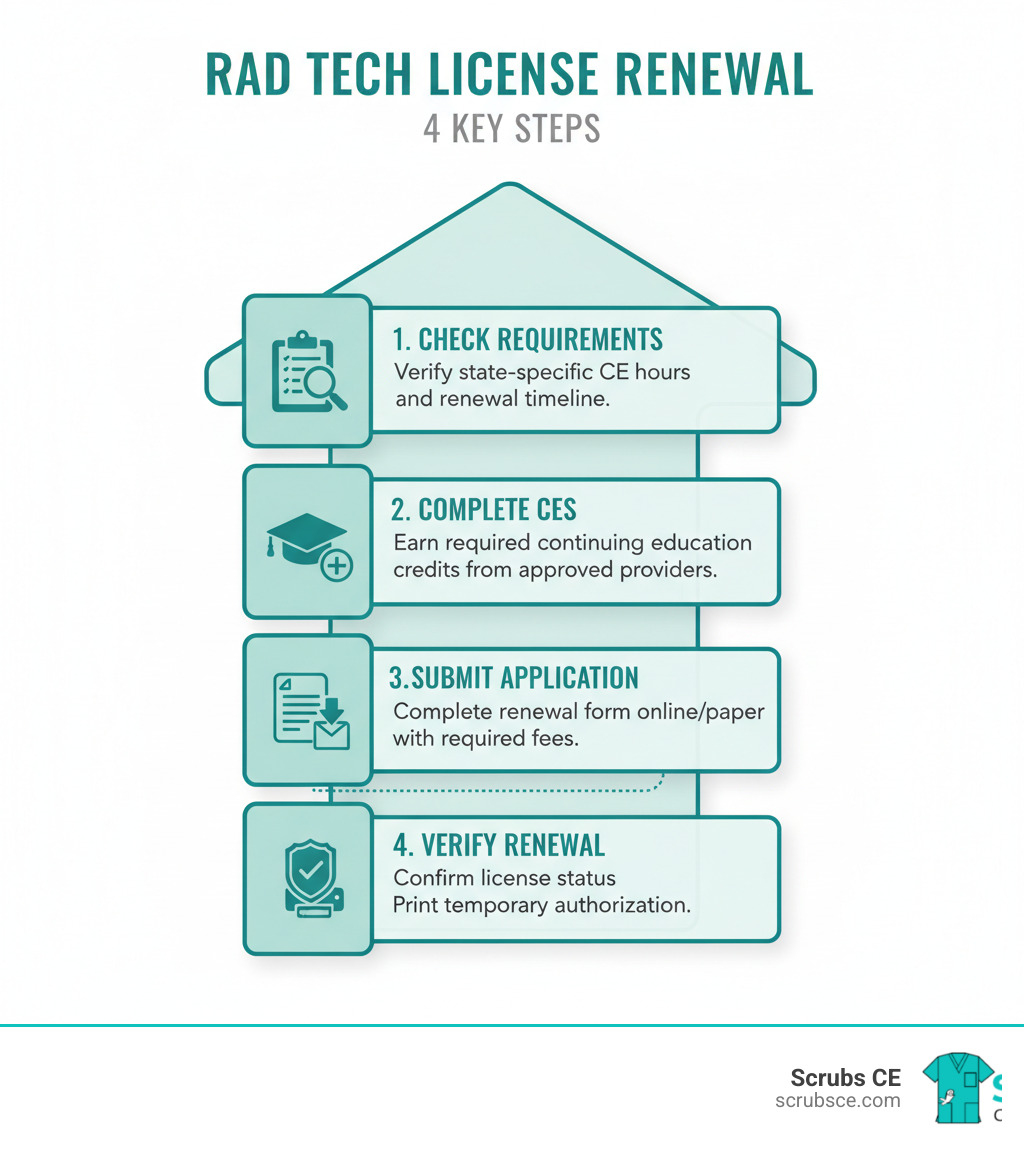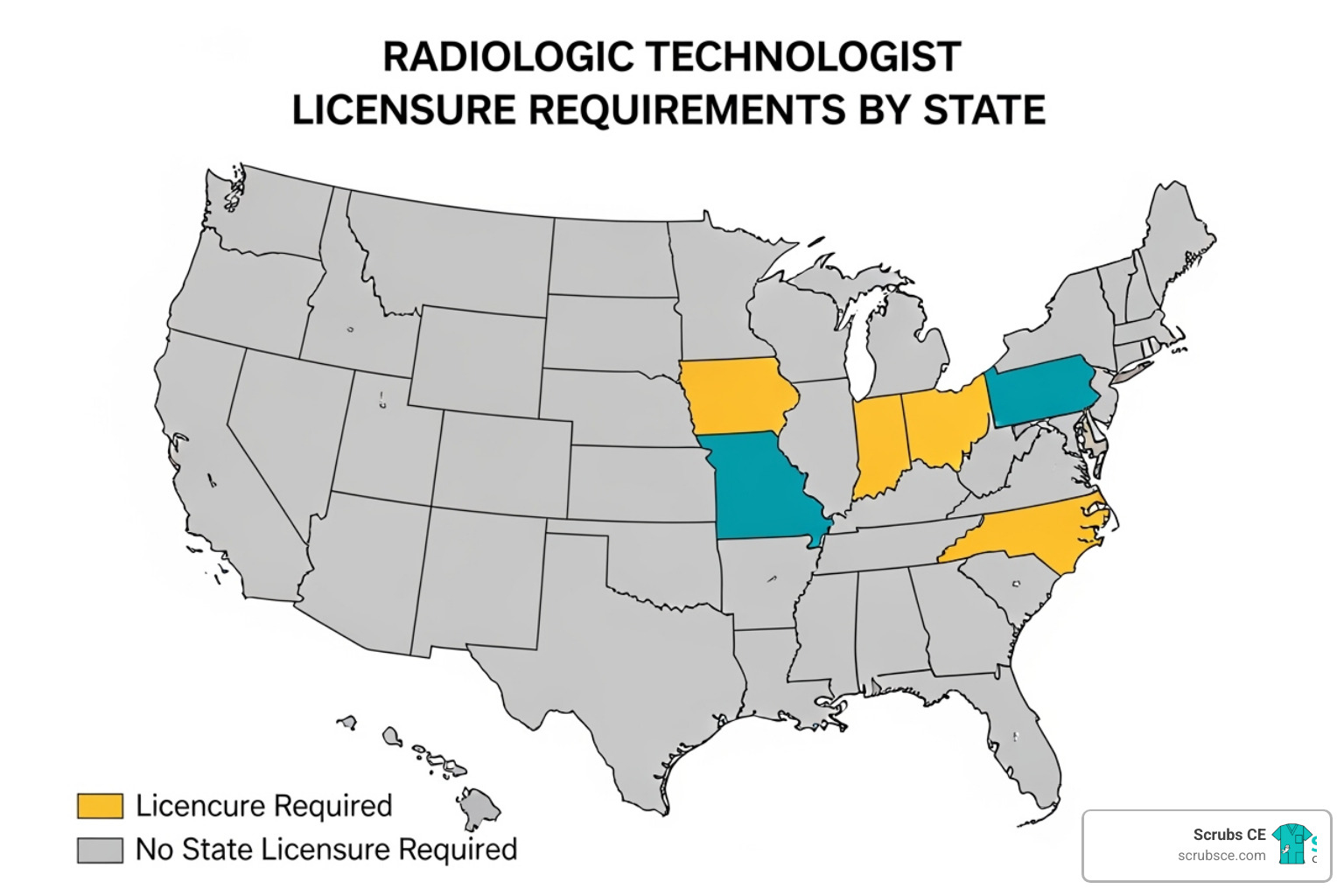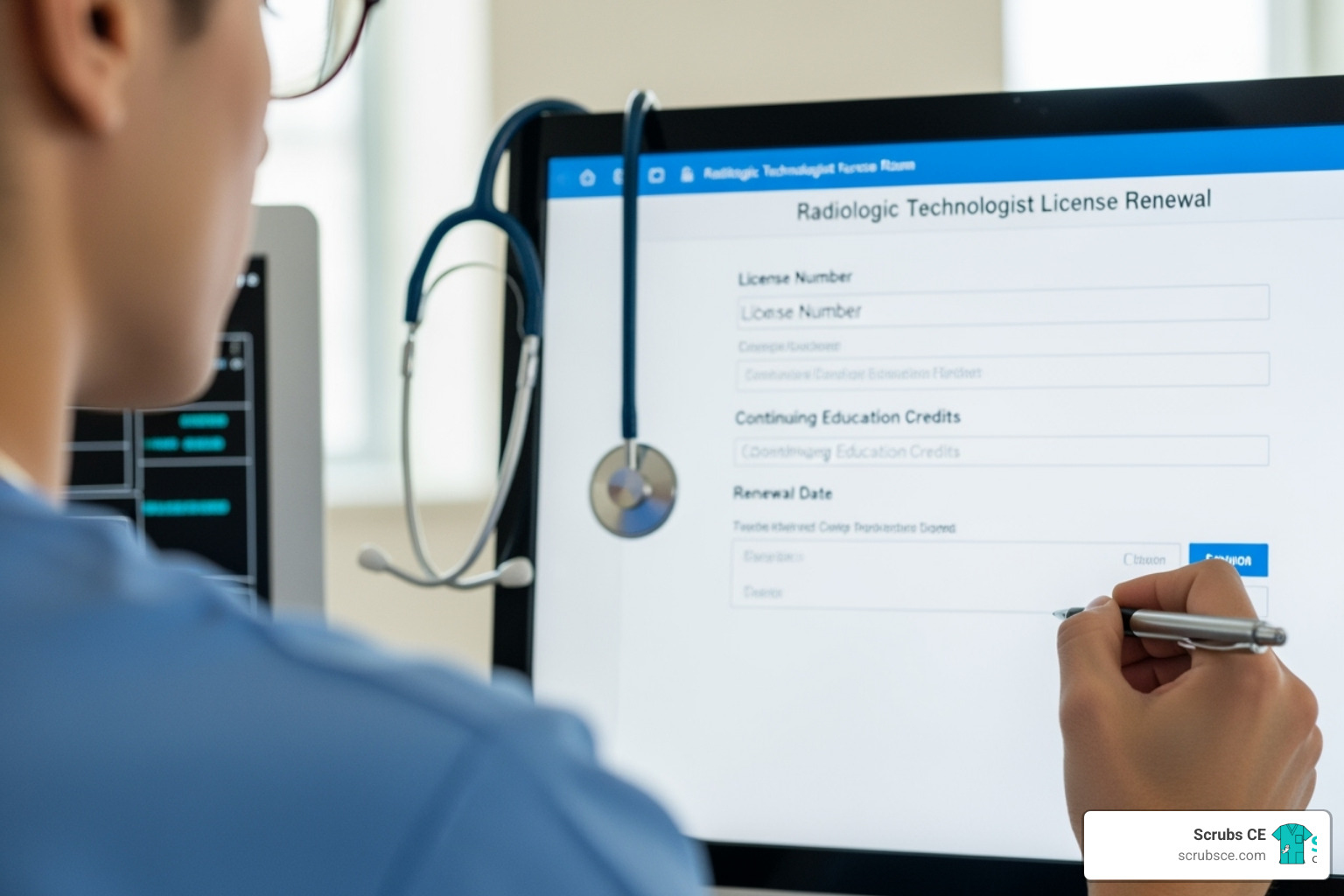Why Rad Tech License Renewal Matters for Your Career
Rad tech license renewal is a mandatory process that keeps you legally authorized to practice. Most states require renewal every two years, which involves completing continuing education (CE) credits and maintaining your ARRT certification.
Quick Answer: Rad Tech License Renewal Requirements
- Frequency: Every 2 years (biennial cycle)
- CE Credits: Typically 24 hours of approved continuing education
- ARRT Renewal: Annual renewal required separately (by birth month)
- State License: Biennial renewal through your state health department
- Fees: Range from $55-$150 depending on your state
- Deadline: Usually 60-90 days before expiration (check your state)
Staying current is essential for patient safety and career advancement. While tracking regulations, CE credits, and deadlines can seem daunting, the process is straightforward once you understand the requirements. Knowing the difference between ARRT certification and state licensing, understanding your CE obligations, and staying ahead of deadlines will make the entire process smooth and stress-free.
Over 75% of states require licensure for radiologic technologists, each with specific rules. While most diagnostic and therapeutic radiographers need 24 CE credits every two years, some specialties have different requirements. You must also maintain your ARRT certification separately through an annual renewal process.
Understanding the Foundation: ARRT Certification vs. State Licensing
One of the most common points of confusion in rad tech license renewal is the difference between ARRT certification and a state license. They are distinct credentials, and you need both to practice legally in most states.
Think of your ARRT certification as a national credential demonstrating your professional competence and ethical standards. It’s recognized nationwide and valued by employers, but it is technically voluntary.
Your state license, however, is your legal permission to work. Over 75% of states require a license, issued by a state health department or radiation control board. Practicing without a license in these states is illegal. Many states use ARRT certification as a basis for licensure, but each state has its own application and renewal process. You must manage both credentials, which have different renewal schedules and requirements. If you’re unsure of your state’s rules, Contact a state licensing board. For state-specific details, see resources like More info about Florida radiologic technology licenses.
ARRT Annual Renewal
Your ARRT certification must be renewed annually to remain in good standing. This is separate from your biennial state license renewal. The deadline is always the last day of your birth month. To renew, you must comply with the ARRT Rules and Regulations and maintain ethical standards.
While renewal is annual, continuing education (CE) is reported on a biennial cycle. You don’t need to submit CE credits every year, but every two years. Additionally, those certified in 2011 or later must complete Continuing Qualifications Requirements every 10 years.
The annual renewal fee is currently $30 for your first discipline and $15 for additional ones. However, starting with renewals due in January 2026, ARRT is moving to a flat fee of $65 for all renewals. The easiest way to renew is online through your ARRT account. For more on educational requirements, see A guide to continuing education for X-ray technologists.
State-Specific License Renewal
While ARRT provides national recognition, your state license grants the legal authority to work. Most states use a biennial (every two years) renewal cycle. This process is managed by your state’s health department or radiation control board, such as the Radiation Control Program in Massachusetts or the Department of Public Health-Radiologic Health Branch in California.
These agencies exist to protect the public by ensuring all practicing technologists meet state-mandated standards. This means your CE requirements, fees, and application procedures are determined by state law and can differ significantly from one state to another.
For example, California requires mailed payments and has specific CE requirements for digital radiography. You can find details at More info about California X-ray licenses. Similarly, Colorado has its own unique processes, which you can learn about at More info about Colorado radiologic technology licenses. Always verify your specific state’s requirements to ensure you remain legally authorized to practice.
Your Core Renewal Checklist: CE Credits and Documentation
Continuing education (CE) credits are the heart of your rad tech license renewal. They ensure you stay current with the latest techniques and technologies in an evolving field. Both ARRT and most states operate on a CE biennium, a two-year period for completing your required hours. Keeping accurate records of your completed courses is essential, especially in case of an audit.
General Continuing Education (CE) Requirements
The standard requirement is 24 approved continuing education credits every two years. This applies to both ARRT and most state licenses. The majority of these credits should be in technical subjects directly related to your work, such as radiation safety, patient care, and imaging techniques.
Some states, like Florida, allow a small number of credits (e.g., 3 of 12) to be in personal development topics like CPR, but the rest must be technical. Florida also requires a one-hour HIV/AIDS update course. You can complete your credits at any point during the two-year cycle. For a breakdown by credential, see How many X-ray CE credits do I need?. For strategies on meeting these requirements, read Satisfying radiology continuing education requirements for the biennium.
Specialty-Specific CE Requirements
If you hold specialty certifications, your CE requirements will be more targeted. You’ll still need 24 total credits, but a portion must be in your specialty.
- Mammography: Technologists often need mammography-specific credits. California, for example, requires 10 of the 24 credits to be in mammography. Learn more in our Mammography technologist license renewal guide.
- Digital Radiography: Many states mandate CE in digital imaging. California requires at least 4 of 24 credits in this area.
- Fluoroscopy: To ensure safety with higher radiation doses, specific CE is required. California fluoroscopy permit holders need 4 of 24 credits in fluoroscopy radiation safety. See our California fluoroscopy license renewal guide for details.
Even with multiple certifications, the total requirement is typically 24 credits. A single course can often satisfy multiple specialty requirements simultaneously.
Finding Approved CE Courses and Providers
Choosing approved courses is critical for a smooth rad tech license renewal. Your safest option is to select courses from ARRT-approved providers, designated as Category A or A+. Use the ARRT’s Find approved CE activities with the ARRT search tool to locate them. While most states accept ARRT-approved courses, always double-check with your state board, as some have their own lists of approved providers.
Online CE courses offer the flexibility busy professionals need. At Scrubs CE, we provide a library of online radiology CE courses designed to meet your renewal needs, allowing you to learn at your own pace. Explore some options at The top X-ray radiology CE credits you can earn online.
Not all health-related courses are accepted. For example, California does not accept MRI, ultrasound, or CPR courses for CRT renewal. After completing a course, save the certificate of completion for at least four years in case of an audit.
Navigating the Rad Tech License Renewal Process Step-by-Step
You’ve completed your CE credits and gathered your documentation. Now comes the moment where everything comes together: actually submitting your rad tech license renewal. This part is more straightforward than you might think, but understanding the timelines, submission options, and fees will help you avoid any last-minute surprises.
Key Timelines and Deadlines
Timing is everything when it comes to rad tech license renewal. Missing a deadline doesn’t just mean a late fee—it can mean you’re technically working without a valid license, which is a serious legal issue.
Your state license typically operates on a biennial renewal cycle, meaning you’ll renew every two years. Most state health departments will send you a renewal notice 60 to 90 days before your expiration date. If you haven’t received your notice 45 days before expiration, don’t wait—reach out to your state board directly.
Your expiration date is usually tied to your birth month, similar to your ARRT renewal. While most states do offer a grace period if you miss the initial deadline, this almost always means paying a late fee. Your annual ARRT renewal has its own separate deadline. For state-specific timelines, like for More info about Idaho radiologic technologist licenses, always check your state’s official health department website for the most current information.
The Rad Tech License Renewal Process: Online vs. Paper
When it’s time to submit your renewal, you’ll typically have two options: online or paper. The method you choose can significantly impact both convenience and how quickly your renewal is processed.
Online renewal is usually the fastest and most convenient option. You can access your state’s licensing portal, complete the form, upload CE certificates, pay by card, and often receive instant confirmation or a temporary permit. For example, you can Renew your license in Florida through their online portal.
Paper applications are still an option, though slower. You’ll need to download the form, fill it out, and mail it with copies of your documents and a check or money order. Some states, like California, only accept mailed payments for renewals. Other states may encourage online submission; Texas, for instance, charges a $50 fee for paper applications when an online option is available. If your state offers online renewal, it’s usually the best choice.
Understanding Fees and Penalties for Rad Tech License Renewal
Renewal fees are part of maintaining your professional credentials, and they can vary quite a bit depending on where you practice and whether you renew on time.
- Active Renewal Fees: Paid before expiration, these typically range from $55 (Florida) to $150 (Massachusetts).
- Late Renewal Penalties: If you renew during the grace period, expect an additional fee, such as Washington’s $50 penalty.
- Expired License Reactivation Fees: These are significantly higher. In California, reactivating a license expired for up to five years costs $224 per category, compared to the standard $104. Florida charges $155 to reactivate an expired license.
If you hold multiple certifications, you may face additional fees for each. Some states also add a small convenience fee for online payments. All fees are almost always non-refundable, so double-check your application and payment details before submitting.
When Things Don’t Go to Plan: Expired Licenses and Special Cases
An expired license is more than an administrative oversight; it can have serious career consequences. However, most situations are fixable, and special provisions exist for circumstances like military service.
What Happens if Your License Expires?
Once your license expires, you are no longer legally authorized to practice. Your license status becomes “expired” or “lapsed.”
You must stop working immediately. Practicing with an expired license violates state regulations and can lead to severe penalties. To restore your license, you must go through a reinstatement or reactivation process, which is more complex and expensive than a standard renewal. Fees are significantly higher; for example, California charges up to $224 per category to reactivate a license expired for less than five years, and Florida charges $155.
You may also need to complete additional CE hours. If a license remains expired for an extended period (typically 5-10 years), it can become null and void. At that point, you would have to re-apply for initial licensure as a new graduate. For more on staying current, see our guide on radiology continuing education requirements in Pennsylvania.
Consequences of Not Renewing on Time
Failing to complete your rad tech license renewal on time can lead to a cascade of professional problems. State licensing boards can impose sanctions like fines, reprimands, or even license revocation, all of which become part of your permanent public record.
Your employer will likely suspend you or terminate your employment, as they cannot legally allow an unlicensed technologist to work. Practicing without a license can also have legal ramifications and damage your professional reputation. The ARRT Standards of Ethics also require you to maintain current credentials. The best strategy is to set multiple reminders and complete your renewal well before the deadline.
Special Considerations for Military Personnel
Many states offer accommodations for military service members and their families to help them manage professional licenses during relocations and deployments.
- Military spouses often qualify for expedited license application processing in a new state.
- Military education and experience may count toward state licensing requirements, which is valuable for those transitioning to civilian practice.
Provisions vary by state. Some offer waivers for renewal fees or extensions for CE completion for those on active duty. For example, Washington state technologists can find specific information on how military service affects their certification. Always contact your state licensing board directly to learn about the benefits available to you.
Frequently Asked Questions about Rad Tech License Renewal
Here are answers to some of the most common questions about rad tech license renewal.
How do I verify my radiologic technologist license status?
Verifying your license is simple and can be done in several ways:
- State License Lookup Portal: Most state health departments have an online verification tool on their website where you can search by name or license number.
- ARRT Directory: You can verify your national credentials through the ARRT’s online directory.
- Temporary Authorization: After renewing online, many states provide a printable temporary authorization to use while you wait for your physical license to arrive.
Your license information is generally public record, which promotes transparency and public safety.
What are the requirements for initial licensing as a radiologic technologist?
While this guide focuses on renewal, the initial licensing process sets the foundation. Key steps include:
- Graduating from an accredited educational program in radiologic technology.
- Passing a primary pathway examination administered by the ARRT.
- Submitting a state-specific application with required documentation, including transcripts and proof of ARRT certification.
- Completing a criminal background check.
- Paying an initial application fee.
Some states have alternative pathways, but ARRT certification is the most common route. For related tips, see More info about Massachusetts CE tips.
Are there any upcoming changes to renewal fees or processes?
Yes, the regulatory landscape can change. The most significant upcoming change is from the ARRT. Starting with renewals due in January 2026, the ARRT will switch to a single flat renewal fee of $65 for all annual renewals, regardless of the number of credentials you hold. This will simplify the process and may save money for those with multiple certifications.
State-level changes occur independently. The best way to stay informed is to regularly check your state’s official licensing board website and subscribe to professional newsletters from organizations like the ARRT. This ensures you are aware of any updates to fees, processes, or requirements for your rad tech license renewal.
Conclusion
By now, you should feel more confident about your rad tech license renewal. The process is manageable once you understand the key components: your ARRT certification and your state license. Both are crucial and require your attention.
The secret to a stress-free renewal is planning. Set reminders for your annual ARRT renewal and your state’s biennial deadline. Keep your CE certificates organized as you earn them so you’re prepared when it’s time to submit your application.
CE requirements are an opportunity to improve your skills and stay current with new technologies, making you a more valuable technologist. Each state has its own rules, so always verify the latest information on your official licensing board’s website.
Maintaining your license is a mark of professionalism and a commitment to providing the best patient care.
Ready to complete your CE requirements? Explore our library of ARRT-approved radiology CE courses. Our courses are convenient, affordable, and self-paced, with instant certificates to help you stay current and advance your career.





Recent Comments